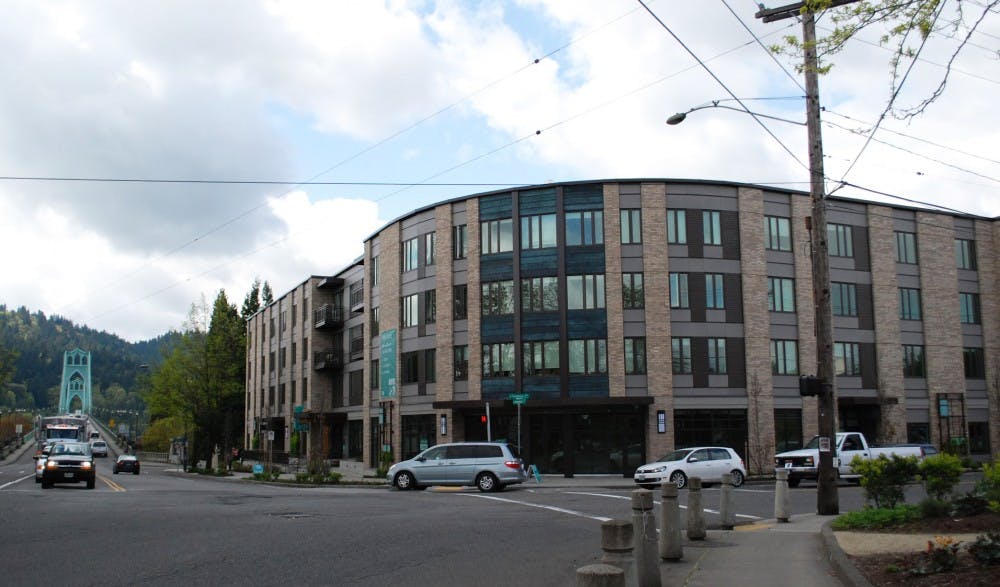Maggie Hannon |
Just outside the UP bubble in North and Northeast Portland, the local community is changing. Rent prices have risen substantially in recent years and affluent businesses like New Seasons are opening throughout the area.
People who cannot afford these prices are being pushed out.
Portland is gentrifying.
A study by Governing Magazine released in February says that out of the 50 major cities in the U.S., Portland is the most gentrified city. 58 percent of the gentrification-eligible tracts throughout the city gentrified, and nearly all of the neighborhoods eligible for gentrification in North and Northeast Portland have gentrified since 2000.
Sommer Slovens, a St. Johns resident, said she was almost forced out of her neighborhood when her rent was going to increase by $275. Although Slovens and her husband had stable jobs, they could not afford this rise in rent. With only 30 days notice until they would have to start paying the increased rent, Slovens feared her family would not find a home in time.
“We were really scared, and I didn’t realize that at any time in life I would become that close to being homeless,” Slovens said.
Although Slovens was able to stay in St. Johns and found a home with less expensive rent, many members of the community are being pushed out of the neighborhoods near the University.
Ifanyi Bell’s video, “Future: Portland,” produced by Oregon Humanities, details the struggles of African Americans living in Portland, a city that is 76 percent white. In the video, which was inspired by Bell’s essay, “The Air I Breathe," several members of the community spoke out against the negative aspects to changes in the neighborhood.
“When I’m driving up Williams Avenue going north, I experience, it’s physical, it’s pain,” former Oregon Senator Avel Gordly says in the video.
A Changing City
With an increase in rent prices in Portland, many people are moving east and to Gresham and the outer reaches of East Portland.
Michael Alexander, president of the Portland Urban League, said many factors have contributed to people being displaced from North and Northeast Portland, which have historically been African American neighborhoods.
“Lots of things have caused that community to be significantly disrupted,” Alexander said. “Because of institutional expansions, because of actions that over decades, city-based organizations and city-based departments have taken steps that have caused the stability of the neighborhood to be impacted in a negative way.”
According to Babs Adamski, former social outreach committee chair of the St. John’s Neighborhood Association, when people are displaced from communities, those being pushed out are not the only ones who suffer.
“When housing gets that expensive, people tend to move away,” Adamski said. “It changes their community, the community they’re leaving behind, and it also changes their lives.”
According to Slovens, the poor are not the only ones who are suffering from gentrification.
“People who aren’t able to afford housing aren’t just the really destitute and the really poor,” Slovens said. “It’s becoming an all across the board... It’s not just homeless or people living off welfare, it’s actual working families who are struggling to put roofs over their heads.”
While Adamksi is concerned for people being pushed out of the neighborhood, she also recognizes the benefits to economic advancement within her neighborhood.
“I’ll be glad to be able to walk to a New Seasons to get the things that I now get from New Seasons on a special trip,” Adamski said. “I like the idea of people living here who are well educated, who will encourage the youth in our community to pursue higher (education) and do things that ultimately will put them in a place to support themselves.”
A History of Racism
Oregon has a dark history of racism, including exclusionary laws created to ensure African Americans could not live in the state. The city of Portland also practiced redlining in several neighborhoods, which means the city denied housing services to African Americans in certain areas.
These practices created the historically African American neighborhoods like those around Mississippi Avenue and Alberta Street.
Junior Sarah Street is writing her thesis on the history of gentrification in Portland. While Street recognizes the benefits some people get from these changes, she believes there are notable impacts for those who can no longer afford to live in these areas.
“There are positive aspects of gentrification that middle- and upper-class individuals get to benefit from,” Street said. “But the problem is what happens to those who are essentially kicked out to make room for the middle- and upper-class.”
No other state in the U.S. had exclusionary laws. UP Sociology Professor Valerie Francisco-Menchavez thinks gentrification is somewhat unique to Portland and the state of Oregon because of these laws.
“(Gentrification) is happening everywhere. What makes it particular to Portland is that Portland has a race problem,” Francisco-Menchavez said. “The state of Oregon was thought to be a haven for white people, and that makes it a problem because it’s driving out all the people of color there.”
Although these institutions have changed, according to Alexander, their effects are still present today.
“The downstream impact is still something that this community has got to overcome,” Alexander said. “Even if the players and the forces that may have triggered it over time have changed, and their focus has changed, the impact of those actions remain.”
What’s being done?
In the last three months, Portland Mayor Charlie Hales announced his plan for spending $20 million in projects for affordable housing in North and Northeast Portland.
Hales disclosed that these funds would be allocated with $8 million going to 70 - 140 new rental units, $5 million going to new housing development and downpayment assistance for up to 72 households, $4 million for home repairs for up to 240 households and $3 million to buy land for future housing.
Because Portland is such a small city compared to other cities also dealing with rapid gentrification, Alexander is optimistic about the city’s ability to combat the issue.
“The scope here is such that if we’re serious about this, the effort that goes into creating solutions or making an impact has a much greater likelihood of making a difference that can be seen and felt within a reasonable time frame, within people’s lifetime,” Alexander said. “We can get our hands around this.”
Maggie Hannon is a reporter for The Beacon. She can be reached at hannon15@up.edu.








